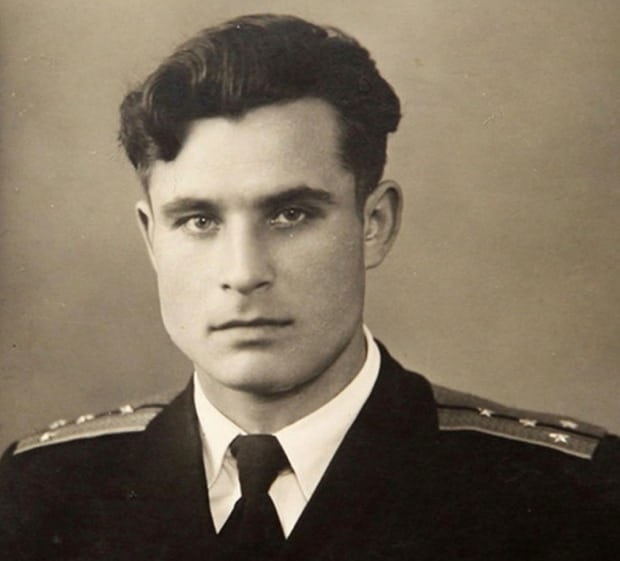Vasili Arkhipov, who prevented escalation of the cold war by refusing to launch a nuclear torpedo against US forces, is to be awarded new ‘Future of Life’ prize
By Nicola Davis, October 27, 2017, The Guardian.

A senior officer of a Soviet submarine who averted the outbreak of nuclear conflict during the cold war is to be honoured with a new prize, 55 years to the day after his heroic actions averted global catastrophe.
On 27 October 1962, Vasili Alexandrovich Arkhipov was on board the Soviet submarine B-59 near Cuba when the US forces began dropping non-lethal depth charges. While the action was designed to encourage the Soviet submarines to surface, the crew of B-59 had been incommunicado and so were unaware of the intention. They thought they were witnessing the beginning of a third world war.
Trapped in the sweltering submarine – the air-conditioning was no longer working – the crew feared death. But, unknown to the US forces, they had a special weapon in their arsenal: a ten kilotonne nuclear torpedo. What’s more, the officers had permission to launch it without waiting for approval from Moscow.
Two of the vessel’s senior officers – including the captain, Valentin Savitsky – wanted to launch the missile. According to a report from the US National Security Archive, Savitsky exclaimed: “We’re gonna blast them now! We will die, but we will sink them all – we will not become the shame of the fleet.”
But there was an important caveat: all three senior officers on board had to agree to deploy the weapon. As a result, the situation in the control room played out very differently. Arkhipov refused to sanction the launch of the weapon and calmed the captain down. The torpedo was never fired.
Had it been launched, the fate of the world would have been very different: the attack would probably have started a nuclear war which would have caused global devastation, with unimaginable numbers of civilian deaths.
“The lesson from this is that a guy called Vasili Arkhipov saved the world,’’ Thomas Blanton, director of the National Security Archive at George Washington University, told the Boston Globe in 2002, following a conference in which the details of the situation were explored.
Now, 55 years after he averted nuclear war and 19 years after his death, Arkhipov is to be honoured, with his family the first recipients of a new award.
The prize, dubbed the “Future of Life award” is the brainchild of the Future of Life Insitute – a US-based organisation whose goal is to tackle threats to humanity and whose advisory board includes such luminaries as Elon Musk, the astronomer royal Prof Martin Rees, and actor Morgan Freeman.
“The Future of Life award is a prize awarded for a heroic act that has greatly benefited humankind, done despite personal risk and without being rewarded at the time,” said Max Tegmark, professor of physics at MIT and leader of the Future of Life Institute.
Speaking to Tegmark, Arkhipov’s daughter Elena Andriukova said the family were grateful for the prize, and its recognition of Arkhipov’s actions.
“He always thought that he did what he had to do and never considered his actions as heroism. He acted like a man who knew what kind of disasters can come from radiation,” she said. “He did his part for the future so that everyone can live on our planet.”
The $50,000 prize will be presented to Arkhipov’s grandson, Sergei, and Andriukova at the Institute of Engineering and Technology on Friday evening.
Beatrice Fihn, executive director of the Nobel peace prize-winning organisation, the International Campaign to Abolish Nuclear Weapons, said Arkhipov’s actions were a reminder of how the world had teetered on the brink of disaster. “Arkhipov’s story shows how close to nuclear catastrophe we have been in the past,” she said.
The timing of the award, Fihn added, is apt. “As the risk of nuclear war is on the rise right now, all states must urgently join the treaty on the prohibition of nuclear weapons to prevent such catastrophe.”
Dr Jonathan Colman, an expert on the Cuban missile crisis at the University of Central Lancashire, agreed that the award was fitting.
“While accounts differ about what went on on board the B-59, it is clear that Arkhipov and the crew operated under conditions of extreme tension and physical hardship. Once the nuclear threshold had been crossed, it is hard to imagine that the genie could have been put back into the bottle,” he said.
“President Kennedy had been very worried about the possibility of a clash between American warships and Soviet submarines in the Caribbean, and it is absolutely clear that his fears were justified,” Colman added, noting that certain decisions at the operational level were out of his control. “Ultimately, it was luck as much as management that ensured that the missile crisis ended without the most dreadful consequences.”









One Response
Let’s hope the board has been changed since this report. Morgan Freeman on anything now is regrettable.